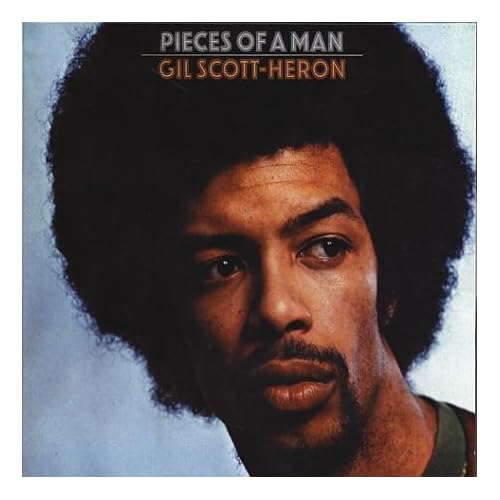
Pieces of a man marked a shift in style for Gil Scott-Heron, leaving behind the spoken word poetry of his debut, to a more traditional soul sound. However the album opens with Herons most famous song and a rerecording of a track on his dbut "The Revolution Will Not Be Televised" is a return to the spoken word style and a call to arms about the state of American culture in the early 70's. From here the album puts aside the political ramblings for more mainstream soul. "Save The Children" is a slow burning track with a nice flute line flowing through it's course, backed with sparse and low in the mix guitar and piano, the hi-hat rhythm driving the track. "Lady Day and John Coltrane" is a nod to the giants of Jazz Billie Holiday and John Coltrane, showing us Scott-Heron's roots and musical taste's and showing how they can "wash your troubles away". Following two upbeat tracks the album turns momentarily dark with the brooding and bitter "Home is Where The Hatred is" extolling the dangers and repercussions of a coke addiction, and how the protagonist can not return home because of the addiction.
A straightforward love song follows in the form of "When You Are Who You Are" with Gil telling a girl that she doesn't need to do anything to impress him, just be herself, with Gil commenting that he doesn't understand why people need to put on disguises, followed by a pair of solos, guitar then sax. "I Think I'll Call It Morning" is a song of pure joy, showing how life can't ever get you down when there is beauty all around.
"Pieces of a Man" is other than the opening track probably the strongest on the Album, a sombre slow track told from the point of view of a son, watching his father's life disintegrate having been laid off, and following a crime his arrest, the closing refrain has the son failing to grasp how this happened saying "He was always such a good man, He was always such a strong man" The piano throughout the track is an excellent accompaniment, following the story closely. "A Sign of The Ages" could almost be the sequel to "Pieces of A Man" as the tone of the song is much the same, with again sombre lyrics about a man at ends with himself, searching for an explanation or answers to anything, again the piano work is strong with a bridge piano refrain, the bass is also quite prominent, but seemingly at odd with the piano track.
"Or Down You Fall" is a forceful track with Gil's vocals straining in places,the lyrics suggesting that we must continue to do something, anything, or down we fall, the kind of flute from save the children makes another welcome appearance, buzzing round the lyrics throughout. "The Needles Eye" is an upbeat track which on the surface sound quite joyous, but the lyrics are not quite all they seem with the lyrics talking about those that don't fit through the needle's eye struggling and eventually going insane.
The album closes with a return to the almost spoken word form with the epic 9 minute "The Prisoner", the lyrics referring to being trapped, trapped in a dead end job, unable to do anything about it and the disgust of his woman, Gil singing "Help me I'm the prisoner, won't you hear my plea" but ultimately no help is found.
One of the stand out aspects of this album beyond Scott-Heron's beautiful is scornful lyrics and his voice, is the excellent instrumentation and arrangement throughout, Brian Jackson's piano is a constant accomplice and is spare and minimal when needed but very vocal at all the right places. Although this is a big shift from the soul-poetry of his dbut the album is still light on instruments, but this seems to suit the songs very well
The Revolution Will Not Be Televised
Pieces of A Man
Save The Children
Rating 9/10
sailorcandy:
yea thats what i did! costs more thru insurance... no nothing goes right for me!!! maybe its karma and i deserve it hahaha hope ur ok?x